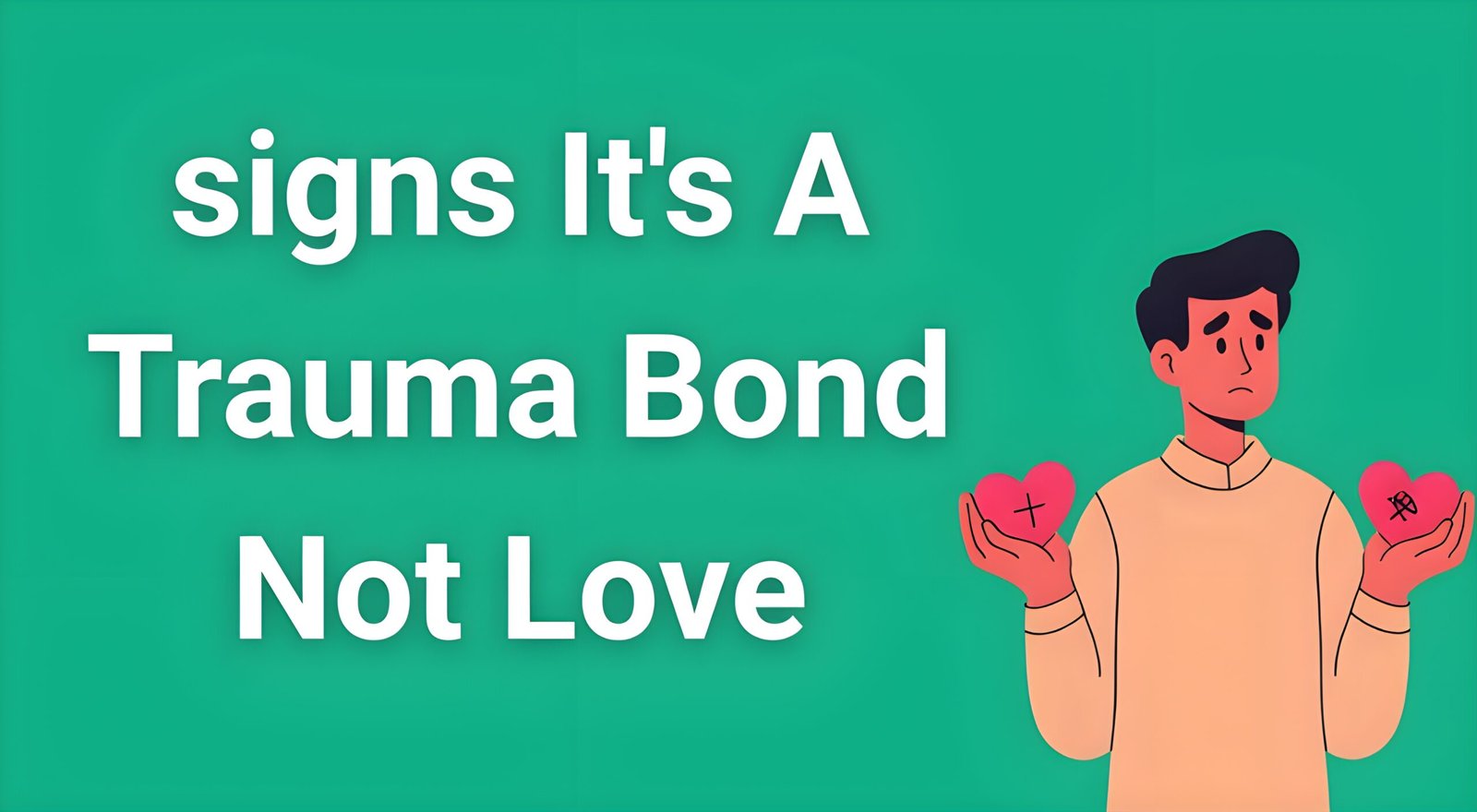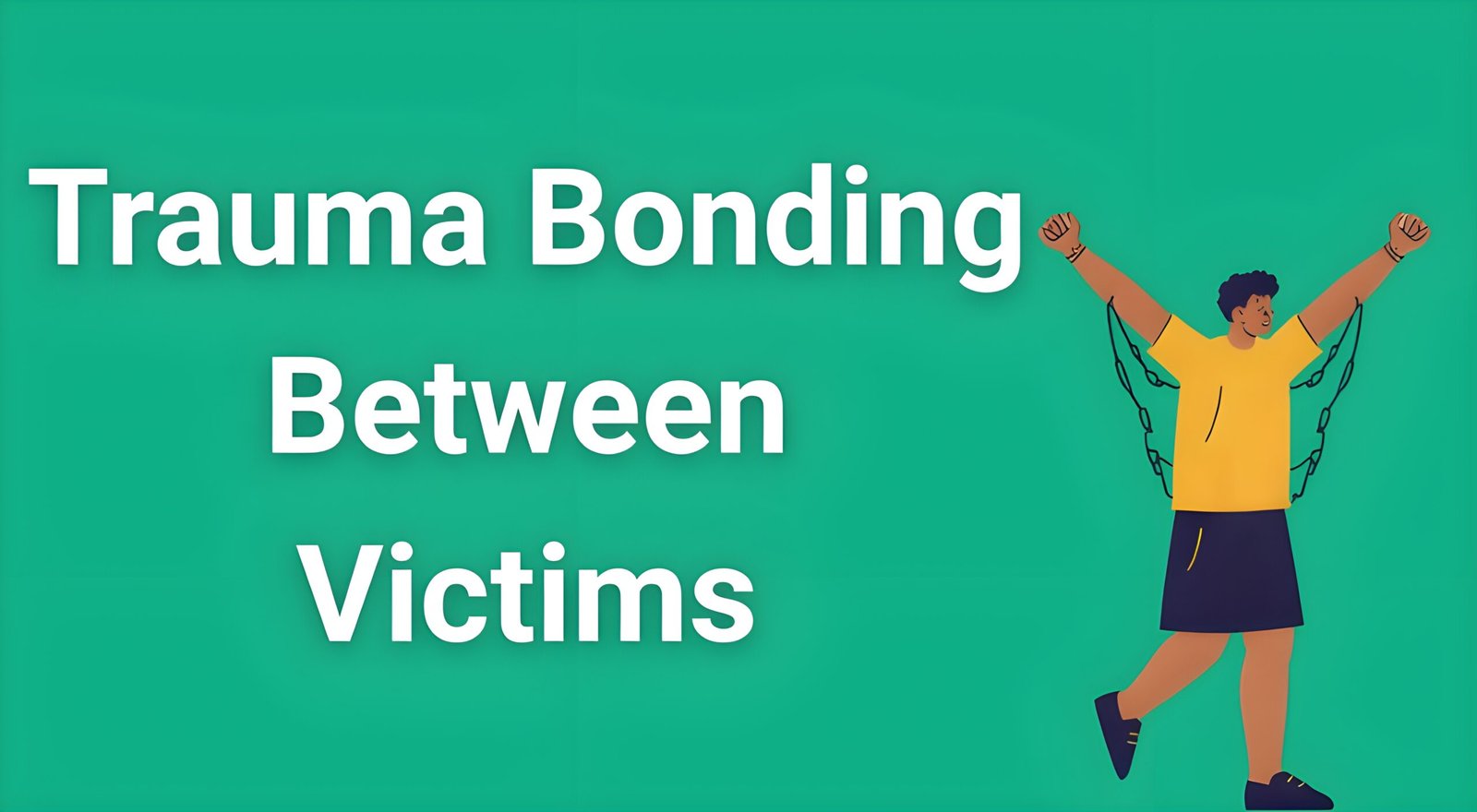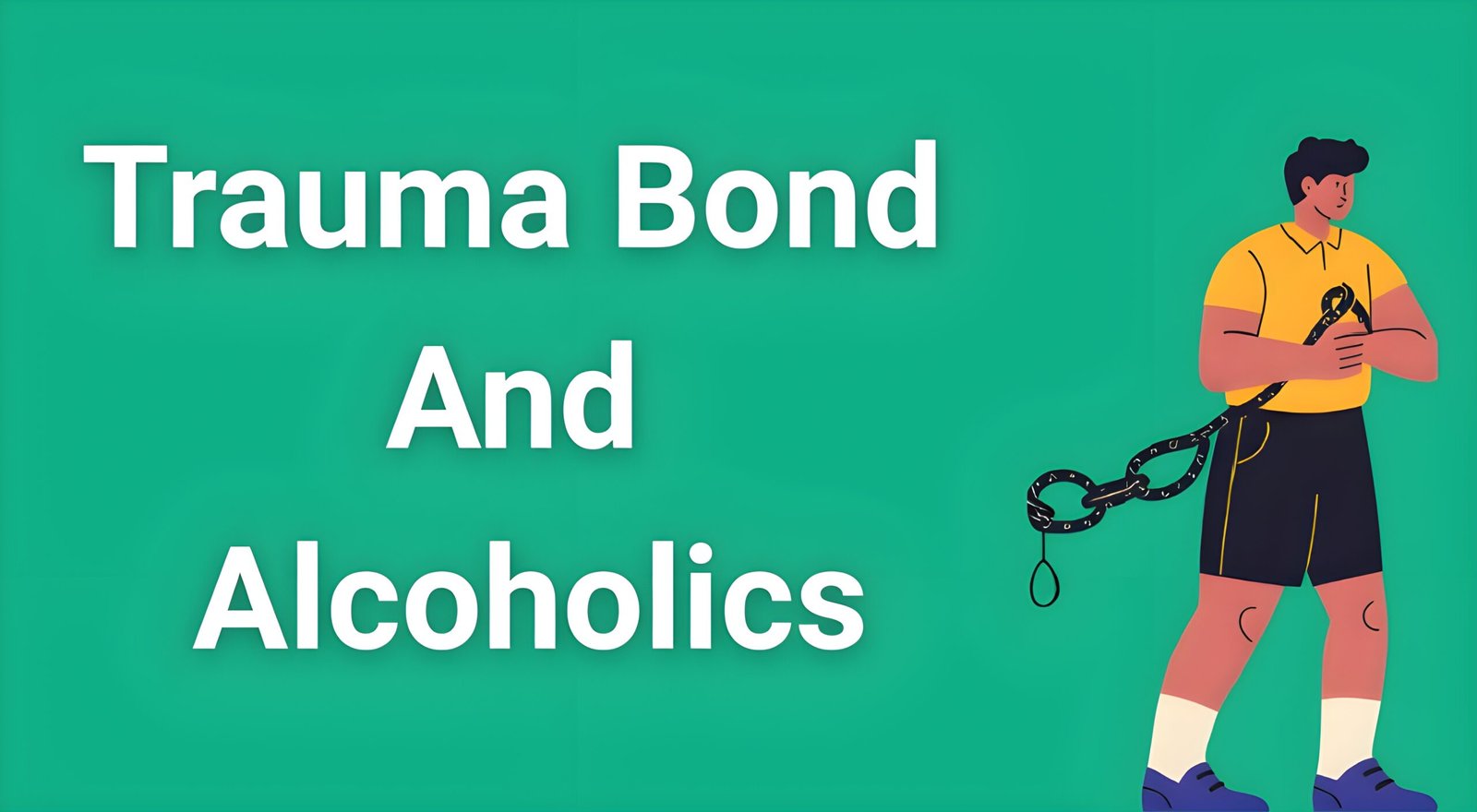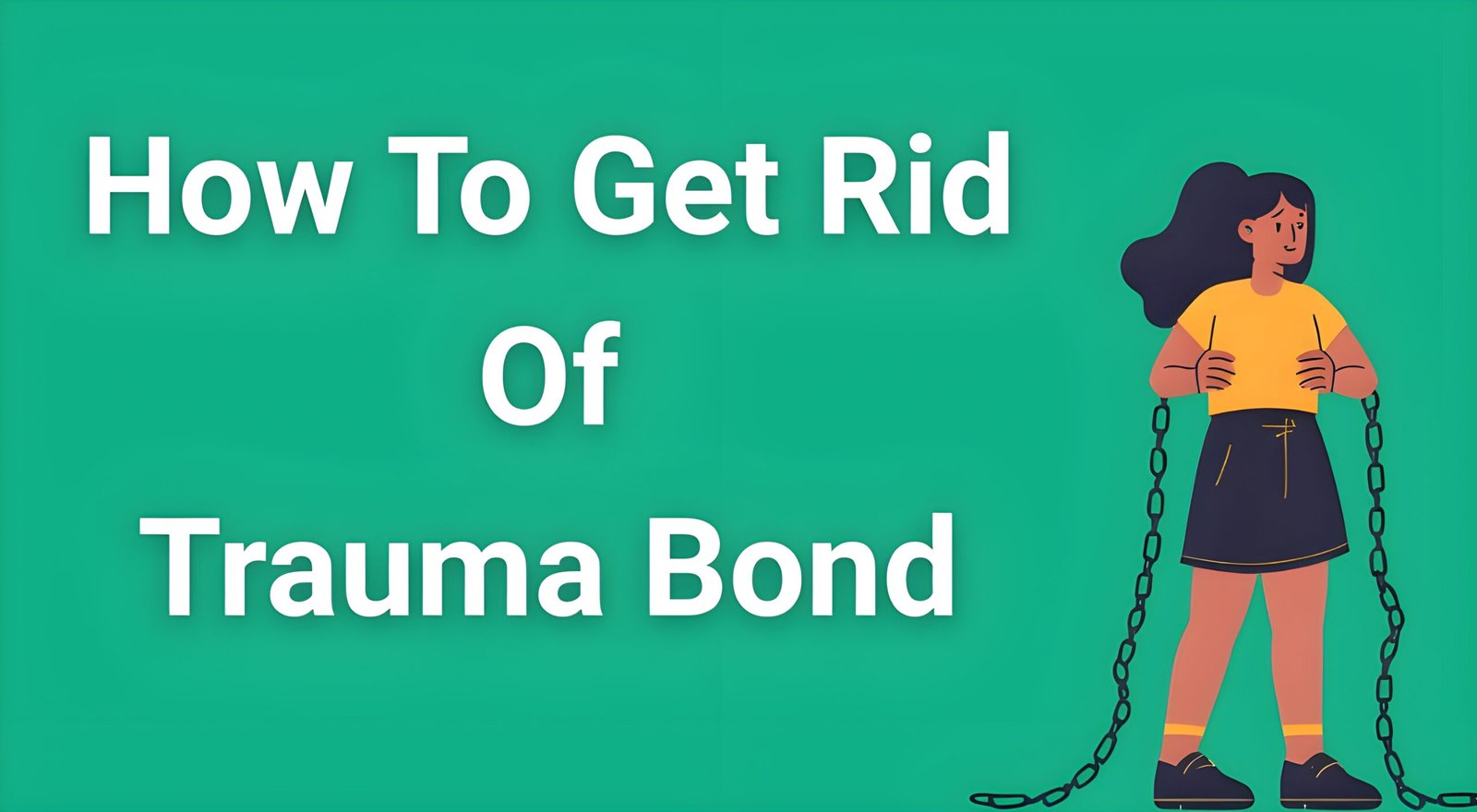Are you constantly questioning whether what you’re feeling is genuine love or something darker? If you’re reading this, chances are you’ve already started to suspect that the intense connection you have with someone might not be the healthy love you once believed it was.
The signs it’s a trauma bond not love are often hidden beneath layers of confusion, hope, and emotional intensity. Unlike healthy love built on mutual respect and genuine care, trauma bonds create an addictive cycle that keeps you trapped in patterns that hurt your well-being, even when your logical mind knows something isn’t right.
This comprehensive guide will reveal the 12 unmistakable signs that you’re experiencing a trauma bond rather than authentic love, helping you understand the crucial difference between these two very different emotional experiences.
What Is a Trauma Bond vs. Real Love?
Before diving into the specific signs it’s a trauma bond not love, it’s essential to understand what we’re actually comparing.
Understanding Trauma Bonds
A trauma bond is an intense emotional attachment that forms between a person and someone who causes them harm. This psychological phenomenon occurs through cycles of abuse followed by periods of affection or relief, creating a powerful addiction-like connection that becomes extremely difficult to break.
Key characteristics of trauma bonds include:
- Formed through intermittent reinforcement (punishment and reward cycles)
- Based on fear, dependency, and survival mechanisms
- Creates intense highs and devastating lows
- Strengthens during crisis or stress
- Involves power imbalances and control
Understanding Healthy Love
Genuine love, in contrast, is built on a foundation of mutual respect, trust, and genuine care for each other’s well-being. Healthy love relationships provide consistent emotional safety and support personal growth for both individuals.
Key characteristics of healthy love include:
- Built on mutual respect and equal partnership
- Provides consistent emotional safety and security
- Encourages individual growth and independence
- Based on trust, communication, and shared values
- Maintains healthy boundaries and autonomy
Now, let’s examine the specific signs it’s a trauma bond not love that you should never ignore.
The 12 Critical Signs It’s a Trauma Bond Not Love
1. Your Relationship Started with Intense Love Bombing
One of the earliest signs it’s a trauma bond not love is the way your relationship began. Trauma bonds often start with an overwhelming shower of affection, attention, and declarations of love that feel almost too good to be true.
Love bombing behaviors include:
- Excessive gifts and grand romantic gestures very early on
- Constant texting, calling, and demands for your time
- Declarations of love within days or weeks
- Claims that you’re “soulmates” or “perfect for each other”
- Rushing physical and emotional intimacy
In healthy love, connection develops gradually through getting to know each other authentically. The intensity builds naturally over time rather than hitting you like a tsunami from day one.
2. You Experience Extreme Emotional Highs and Lows
Perhaps the most telling of all signs it’s a trauma bond not love is the emotional rollercoaster that defines your relationship. One day you feel on top of the world, completely loved and cherished. The next day, you’re devastated, confused, and desperately trying to get back to those “good times.”
This cycle typically involves:
- Periods of intense closeness and affection
- Sudden withdrawals, silent treatments, or criticism
- Your emotional state completely dependent on their mood
- Feeling like you’re constantly walking on eggshells
- Dramatic reconciliations that feel incredibly relieving
Healthy relationships have their ups and downs, but they maintain a baseline of respect and care even during difficult periods.
3. You’re Constantly Making Excuses for Their Behavior
When friends or family express concern about how you’re being treated, do you find yourself defending your partner’s actions? This is one of the most common signs it’s a trauma bond not love.
Common excuses include:
- “They’ve had a hard life/childhood”
- “They’re under a lot of stress at work”
- “They don’t really mean it when they say hurtful things”
- “Everyone has flaws”
- “You just don’t understand our relationship”
In trauma bonds, you become skilled at rationalizing behavior that you would never tolerate from anyone else. This mental gymnastics protects the bond but prevents you from acknowledging the reality of your situation.
4. You Feel Anxious Instead of Peaceful Around Them
Healthy love should make you feel safe, secure, and at peace. If being around your partner consistently makes you feel anxious, hypervigilant, or on edge, this is a significant sign it’s a trauma bond not love.
Physical signs of relationship anxiety:
- Stomach knots or nausea when they’re around
- Difficulty sleeping when they’re in the house
- Racing heart during conversations
- Physical tension in your body
- Feeling like you need to be “on” or perform to keep them happy
Your nervous system is trying to tell you something important. In trauma bonds, your body often recognizes danger before your mind does.
5. You’ve Lost Your Sense of Self
One of the most devastating signs it’s a trauma bond not love is the gradual erosion of your identity. You may notice that you’ve stopped engaging in activities you once enjoyed, lost touch with friends and family, or changed fundamental aspects of yourself to please your partner.
Identity erosion looks like:
- Abandoning hobbies, interests, or career goals
- Adopting their opinions and losing your own voice
- Changing your appearance to meet their preferences
- Isolating from support systems
- No longer recognizing the person you’ve become
In healthy relationships, both partners encourage each other’s individual growth and maintain their unique identities while building a life together.
6. You Obsessively Monitor Their Moods and Behavior
When your emotional well-being depends entirely on another person’s mood, it’s a clear sign it’s a trauma bond not love. You might find yourself constantly analyzing their tone, facial expressions, and behavior to predict how they’ll treat you.
Hypervigilance behaviors include:
- Checking their social media obsessively
- Analyzing every text message for hidden meaning
- Walking on eggshells to avoid setting them off
- Changing your behavior based on their moods
- Feeling responsible for managing their emotions
This exhausting mental state is a trauma response, not a feature of healthy love.
7. You Can’t Imagine Life Without Them (Despite the Pain)
This is the sign you absolutely cannot ignore. Despite being hurt repeatedly, you feel like you literally cannot survive without this person. The thought of leaving fills you with panic, and you may even feel like you’d rather die than be without them.
This dependency manifests as:
- Panic attacks when they threaten to leave
- Believing you’re worthless without them
- Feeling like they’re the only person who could ever love you
- Inability to make decisions without their input
- Physical withdrawal symptoms when separated
This intense dependency is the hallmark of trauma bonding and is fundamentally different from the interdependence found in healthy relationships.
8. The “Good Times” Keep You Hooked
The intermittent moments of kindness, affection, or “how things used to be” keep you believing that the relationship can return to those early days. These sporadic positive experiences are actually what make trauma bonds so difficult to break.
The addiction cycle involves:
- Periods of abuse or neglect
- Sudden return to loving behavior
- Overwhelming relief and gratitude
- Hope that things are “getting better”
- Increased attachment and loyalty
This pattern creates a biochemical addiction in your brain similar to gambling or drug addiction. The unpredictable rewards actually strengthen the bond rather than healthy, consistent love.
9. You’re Isolated from Support Systems
Trauma bonds thrive in isolation. If you’ve gradually lost touch with friends and family, or if your partner actively discourages these relationships, this is a crucial sign it’s a trauma bond not love.
Isolation strategies include:
- Claiming your friends “don’t understand” your relationship
- Creating conflict with your family members
- Demanding all of your free time and attention
- Making you feel guilty for spending time with others
- Moving you away from your support network
Healthy partners encourage and support your other relationships, understanding that a strong support network benefits everyone.
10. You Experience Physical Symptoms of Chronic Stress
Trauma bonds take a severe toll on your physical health. If you’re experiencing unexplained physical symptoms that started or worsened since the relationship began, your body may be responding to chronic emotional trauma.
Common physical symptoms:
- Chronic headaches or migraines
- Digestive issues and stomach problems
- Frequent illness due to weakened immune system
- Sleep disturbances and insomnia
- Unexplained aches and pains
Your body keeps the score of emotional abuse, even when your mind tries to minimize or rationalize what’s happening.
11. You Feel Guilty for Having Needs or Boundaries
In trauma bonds, having personal needs or boundaries is often treated as selfish or unreasonable. You may find yourself apologizing for basic human needs or feeling guilty for asking for respect.
This dynamic shows up as:
- Apologizing for expressing feelings or needs
- Feeling selfish for wanting time alone or with friends
- Being afraid to disagree or have different opinions
- Suppressing your own desires to keep peace
- Feeling like your needs are too much or burdensome
Healthy love welcomes your authentic self, including your needs and boundaries.
12. You Keep Returning Despite Promising Yourself You’ll Leave
The final and perhaps most telling sign it’s a trauma bond not love is the cycle of leaving and returning. You may have broken up multiple times, promising yourself and others that it’s really over, only to find yourself drawn back again and again.
This pattern includes:
- Multiple breakups and reconciliations
- Promises to yourself and others that you’ll leave
- Finding reasons to contact them during no-contact periods
- Feeling physically and emotionally compelled to return
- Each return feeling both relieving and shameful
This cycle isn’t a sign of weakness—it’s a sign of trauma bonding, and it requires specific strategies to break permanently.
Why Trauma Bonds Feel Like Love
Understanding why trauma bonds can feel so much like love helps explain why they’re so difficult to recognize and escape. Several psychological mechanisms make these toxic connections feel incredibly meaningful:
Biochemical Addiction
Trauma bonds create literal addiction in your brain. The cycle of stress (from abuse or conflict) followed by relief (from reconciliation or affection) triggers the release of powerful chemicals like dopamine and oxytocin. This creates the same addiction patterns found in gambling or substance abuse.
Intermittent Reinforcement
This psychological principle explains why trauma bonds are often stronger than healthy relationships. Just like slot machines, the unpredictable nature of when you’ll receive love and affection makes it more addictive than consistent kindness.
Survival Mechanisms
Your nervous system may interpret the intense connection as necessary for survival, especially if you experienced similar dynamics in childhood. Your brain believes that maintaining this bond is literally a matter of life and death.
Breaking Free: Your Path to Recovery
Recognizing these signs it’s a trauma bond not love is the crucial first step, but breaking free requires specific strategies and often professional support.
Immediate Safety Planning
If you’re ready to address your trauma bond, start with creating a safety plan:
- Reach out to trusted friends or family members
- Document incidents of abuse or manipulation
- Secure your finances and important documents
- Know where you can go if you need to leave quickly
- Contact domestic violence resources if needed
For many people dealing with trauma bonds, leaving isn’t immediately possible due to financial, legal, or safety concerns. If you’re in this situation, there are specific strategies to protect your mental health while you prepare for eventual freedom.
Professional Support Options
Breaking trauma bonds often requires professional help because willpower alone isn’t enough to overcome the biochemical addiction. Consider:
- Trauma-informed therapy specialists
- Support groups for abuse survivors
- Domestic violence counselors
- EMDR or other trauma processing therapies
Getting Personalized Guidance
Every trauma bond situation is unique, which is why generic advice often falls short. If you’re ready to get crystal-clear understanding of your specific situation, consider getting a comprehensive analysis from someone who specializes in these complex dynamics.
A professional analysis can help you:
- Identify the specific manipulation tactics being used
- Understand your particular trauma bond patterns
- Create a personalized safety and exit strategy
- Validate your experiences and end the confusion
- Develop targeted recovery approaches
For those ready to break free from obsessive thoughts and compulsive behaviors associated with trauma bonding, structured recovery programs can provide the day-by-day guidance needed to rewire your brain’s addictive patterns.
The Road to Healthy Love
Once you’ve identified the signs it’s a trauma bond not love and begun your recovery journey, you’ll gradually learn what healthy love actually feels like. This process takes time, patience, and often professional support, but it’s absolutely possible to experience genuinely nurturing relationships.
Characteristics of healthy love include:
- Consistent respect and kindness
- Emotional safety and security
- Encouragement of your individual growth
- Healthy conflict resolution
- Mutual support and partnership
- Trust without surveillance or control
Frequently Asked Questions
Q: Can a trauma bond ever become healthy love?
A: While rare, trauma bonds can potentially transform into healthy relationships if both people are committed to extensive therapy and changing the fundamental dynamics. However, most experts recommend ending trauma-bonded relationships and focusing on individual healing first.
Q: How long does it take to break a trauma bond
? A: Breaking a trauma bond is a process that can take months or years, depending on the intensity of the bond and the support available. The good news is that with proper strategies, many people see significant improvement in obsessive thoughts and compulsive behaviors within weeks.
Q: Why do I keep going back even though I know it’s bad for me?
A: This is the nature of trauma bonding—it creates a literal addiction in your brain that makes logical decision-making extremely difficult. You’re not weak; you’re fighting biochemical addiction that requires specific strategies to overcome.
Q: Is it possible to have a trauma bond with family members?
A: Absolutely. Trauma bonds commonly form between children and parents, especially in households with narcissistic abuse, addiction, or other dysfunction. Adult children often struggle with trauma bonds to toxic parents well into adulthood.
Q: What’s the difference between codependency and trauma bonding?
A: While they can overlap, codependency is typically about enabling and caretaking behaviors, while trauma bonding specifically involves cycles of abuse and reconciliation that create addiction-like attachment. Trauma bonds are generally more intense and harder to break.
Conclusion: Your Freedom Starts With Truth
Recognizing these signs it’s a trauma bond not love is often painful but absolutely necessary for your mental, emotional, and physical well-being. The confusion, self-doubt, and emotional rollercoaster you’ve been experiencing isn’t love—it’s the result of carefully orchestrated cycles designed to keep you attached to someone who isn’t capable of truly loving you.
Remember that acknowledging these patterns doesn’t minimize the intensity of what you’ve felt. Trauma bonds can feel more intense than healthy love precisely because they’re designed to hijack your brain’s reward and attachment systems. The person you’ve been trauma-bonded to may have seemed like your soulmate, your perfect match, or your one true love—but these feelings were manufactured through manipulation, not authentic connection.
Your healing journey starts with self-compassion. You didn’t choose to be trauma-bonded, and the confusion you’ve felt is a normal response to abnormal treatment. With the right support, strategies, and commitment to your own well-being, you can break free from this toxic cycle and eventually experience the peace, security, and authentic love you deserve.
The signs it’s a trauma bond not love are clear once you know what to look for. Trust what you’re seeing, trust what your body is telling you, and trust that you deserve so much better than a relationship that leaves you constantly questioning your worth and sanity.
Your freedom—and your future capacity for healthy love—depends on your willingness to see the truth and take action to protect yourself. You’ve already taken the first step by learning to recognize these patterns. Now it’s time to take the next step toward reclaiming your life.






